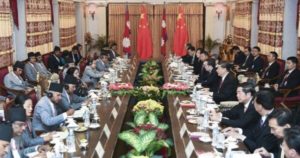
Chinese Chairman Xi Jinping meeting with Nepal’s President Bidhya Devi Bhandari in Kathmandu, Nepal, on Oct 12, 2019
The International Campaign for Tibet (ICT) has obtained copies of two secret agreements signed by the Nepalese and Chinese government during Xi Jinping’s visit to Kathmandu in October. The agreements could have serious consequences for Tibetans fleeing to Nepal from China and those currently residing there.
A new “Boundary Management System” has been agreed between the two countries. Under this law both sides commit to returning “persons found while crossing the border illegally” to their country of origin within seven days. This will impact Tibetan refugees escaping from oppressive Chinese rule, likely landing them in Chinese prisons via Nepalese policy custody. Nepal had previously vowed to “not forcibly return any asylum seekers from its soil” in a 2003 letter to Dianne Feinstein, an influential United States Senator.
The second agreement is called the “Mutual Legal Assistance in Criminal Matters Treaty”. Human rights activists are concerned that this could be used to target Tibetan refugees in Nepal. Gopal Krishna Ghimire, a Nepalese lawyer, was quoted in the press as saying, “China can tell our government tomorrow that a particular Tibetan refugee has committed a crime in China and s/he should be kept under surveillance. In that case, the Tibetan refugee could be unfairly targeted.” Digitised information on Tibetan refugees kept by Nepali police is also likely to be shared with the Chinese.
Matteo Mecacci, spokesperson for the ICT, said that the agreements represent “a serious deterioration of human rights in Nepal.” Amid fears that a temporarily shelved extradition treaty between China and Nepal may soon be signed, leading to the return to China of long time Tibetan residents of Nepal, Mecacci called on Nepal to “reassure the international community that it will continue to protect the Tibetan refugees who reside or arrive in its territory.”
Nepal joined Xi Jinping’s signature Belt and Road Initiative in 2017 and accepted millions of dollars of Chinese investment for infrastructure projects. Subsequently, Nepal’s sovereignty and judicial independence has been called into question. Speaking to Radio Free Asia’s (RFA) Tibetan service, Kapil Shrestha, a political science professor at Tribhuvan University in Kathmandu, said that Nepal has been “tremendously influenced by Chinese pressure and policies” in recent years. One Tibetan resident of Kathmandu told RFA that she had previously felt safe in Nepal so long as she avoided political activities, but during Xi’s visit last year she “felt what it was really like to have no country” of her own.
An estimated 20,000 Tibetans currently live in Nepal. It is thought that around 3,000 to 4,000 of them do so without legal papers.




 Print
Print Email
Email